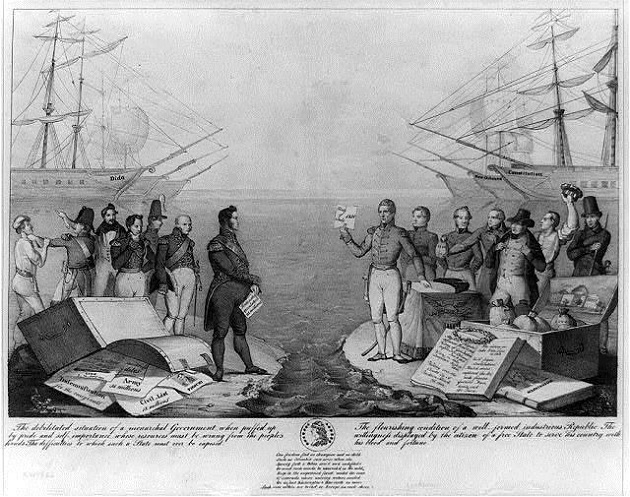Although some Americans considered the United States unprepared for large-scale war, late successes and treaty concessions meant that the young republic had earned respect from other nations.
“As to the people of Europe, public opinion was most decidedly in our favor.” - Treaty negotiator Albert Gallatin reflecting on relations between America and Europe

The Debilitated Situation of a Monarchal Government, Print (Lithograph), 1836, Library of Congress.
Although the thirteen American colonies had successfully won their independence from Britain by force of arms during the Revolutionary War in the late 1700s, many people doubted the young republic could compete against the power of large empires such as Britain and France in the early nineteenth century. During congressional debates about war with Britain, Virginia representative Daniel Sheffey warned, “We have considered ourselves of too much importance in the scale of nations.”
Compared to other powerful nations in 1812, the United States was an unlikely competitor. It had a tiny navy and an inadequate army. It struggled against native tribes to expand its western border, and was dependent on European trade to sustain its economy. In contrast, the British empire was able to colonize and protect its trade throughout the world with a mighty navy and professional army.
The War of 1812, however, became a source for nationalist rhetoric. Despite early losses in the north, the Americans successfully defended against a British invasion at New Orleans. They also gained concessions while negotiating a treaty, which allowed them to increase their western expansion. Although the Americans had won very little territory or wealth, they had once again stood against Britain and had not surrendered.
After helping negotiate the Treaty of Ghent, former Secretary of the Treasury Albert Gallatin noted the improvement of Europeans’ opinion of the United States. “Our ability to resist alone the now very formidable military power of England,” he wrote, “will raise our character and consequence in Europe.” He concluded that their successes in war will cause the United States “to be courted as much as we have been neglected by foreign governments.”
Although the American goals for the War of 1812 were not won through a feat of arms, ambassadors and politicians turned a few successes and the treaty into a story of American strength and ascendancy.
Last updated: March 15, 2016
